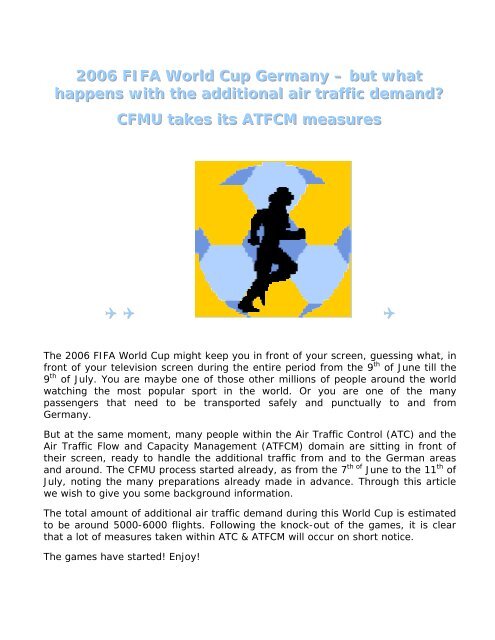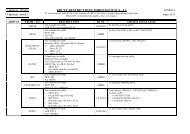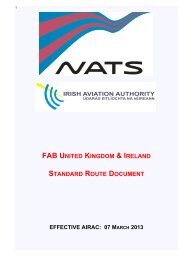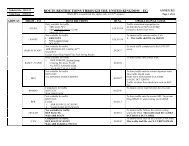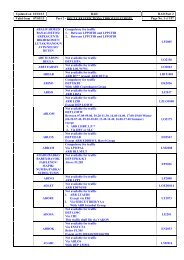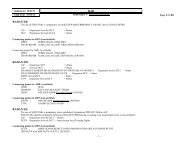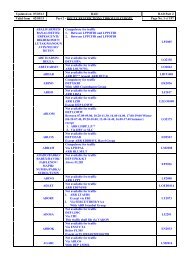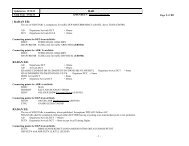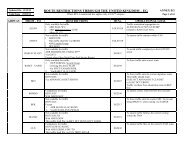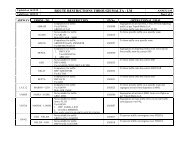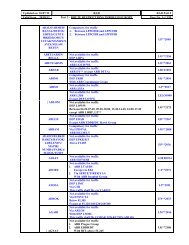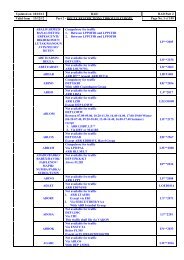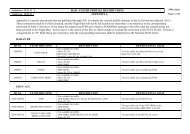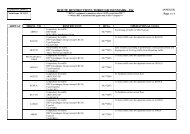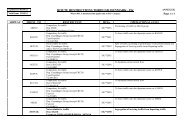2006 FIFA World Cup Germany - CFMU - Eurocontrol
2006 FIFA World Cup Germany - CFMU - Eurocontrol
2006 FIFA World Cup Germany - CFMU - Eurocontrol
Create successful ePaper yourself
Turn your PDF publications into a flip-book with our unique Google optimized e-Paper software.
<strong>2006</strong> <strong>FIFA</strong> Worlld <strong>Cup</strong> <strong>Germany</strong> – but what<br />
happens wiith the addiitiionall aiir traffiic demand?<br />
<strong>CFMU</strong> takes iits ATFCM measures<br />
�� �� ��<br />
The <strong>2006</strong> <strong>FIFA</strong> <strong>World</strong> <strong>Cup</strong> might keep you in front of your screen, guessing what, in<br />
front of your television screen during the entire period from the 9 th of June till the<br />
9 th of July. You are maybe one of those other millions of people around the world<br />
watching the most popular sport in the world. Or you are one of the many<br />
passengers that need to be transported safely and punctually to and from<br />
<strong>Germany</strong>.<br />
But at the same moment, many people within the Air Traffic Control (ATC) and the<br />
Air Traffic Flow and Capacity Management (ATFCM) domain are sitting in front of<br />
their screen, ready to handle the additional traffic from and to the German areas<br />
and around. The <strong>CFMU</strong> process started already, as from the 7 th of June to the 11 th of<br />
July, noting the many preparations already made in advance. Through this article<br />
we wish to give you some background information.<br />
The total amount of additional air traffic demand during this <strong>World</strong> <strong>Cup</strong> is estimated<br />
to be around 5000-6000 flights. Following the knock-out of the games, it is clear<br />
that a lot of measures taken within ATC & ATFCM will occur on short notice.<br />
The games have started! Enjoy!
What is involved in the games?<br />
Just as at France 98 and Korea/Japan in 2002, thirty-two teams and 1 team of<br />
referees are taking part in the football games. In total 736 players, trainers and<br />
support staff, 12,000 journalists, thousands of VIPs and several million fans have to<br />
be transported safely and punctually during the <strong>FIFA</strong> <strong>World</strong> <strong>Cup</strong> – at the busiest<br />
time of the year in terms of tourist travel in <strong>Germany</strong>. <strong>FIFA</strong> says, if the German<br />
stadiums are filled to capacity, it will accommodate 3.5 million fans during the<br />
<strong>World</strong> <strong>Cup</strong>. But they expect a total of ten million visitors, one million from abroad,<br />
of course not all travelling by air.<br />
The 66 games will be played in 12 towns:<br />
Berlin, Dortmund, Frankfurt,<br />
Gelsenkirchen, Hamburg,<br />
Hanover, Kaiserslautern,<br />
Cologne, Leipzig, Munich,<br />
Nuremberg and Stuttgart.<br />
The International Media Centre<br />
(IMC) will be based in Munich,<br />
while the media centres in<br />
Berlin and Dortmund will offer<br />
more extensive facilities than<br />
the other venues. <strong>World</strong><br />
governing body <strong>FIFA</strong> will<br />
establish its headquarters in<br />
Berlin.<br />
The phase one of the <strong>2006</strong> <strong>FIFA</strong> <strong>World</strong> <strong>Cup</strong> starts as<br />
follows:<br />
You might be participating in prediction polls, but to what extend can ATFCM be<br />
built on the results?<br />
Group A: <strong>Germany</strong>, Costa Rica, Poland, Ecuador<br />
Group B: England, Paraguay, Trinidad and Tobago, Sweden<br />
Group C: Argentina, Côte d’Ivoire, Serbia and Montenegro, Netherlands<br />
Group D: Mexico, Iran, Angola, Portugal<br />
Group E: Italy, Ghana, USA, Czech Republic
Group F: Brazil, Croatia, Australia, Japan<br />
Group G: France, Switzerland, Republic of Korea, Togo<br />
Group H: Spain, Ukraine, Tunisia, Saudi Arabia<br />
And then? You guess. A number of factors concerning the travel behaviour of fans<br />
will be quite difficult to anticipate. If popular teams with a great number of<br />
supporters are unexpectedly knocked out of the tournament of the games, this<br />
would also affect the travel behaviour of larger fan groups. Besides, important<br />
security measures are taken.<br />
Specific measures taken by DFS, in the mean time<br />
<strong>CFMU</strong> stands by<br />
DFS Deutsche Flugsicherung GmbH is<br />
responsible for air traffic control in<br />
<strong>Germany</strong>. As a company organised<br />
under private law, DFS is 100%<br />
owned by the Federal Republic of<br />
<strong>Germany</strong>.<br />
The company's Headquarters are<br />
located in Langen, near Frankfurt.<br />
DFS is represented at 19 international<br />
and regional airports throughout<br />
<strong>Germany</strong>. The remaining airports also<br />
operate under the supervision of DFS.<br />
Various German airports have<br />
been defined as coordinated<br />
airports. As such, the 12<br />
following coordinated airports<br />
require aircraft operators to<br />
obtain an airport slot from<br />
the German airport<br />
Coordinator (FHKD).<br />
The increase in air traffic in <strong>Germany</strong> are<br />
particularly to and from the airports<br />
which are near the football venues and at<br />
the opening match and the final.<br />
The increased traffic especially concerns<br />
the following international airports:<br />
Frankfurt Main (EDDF), München (EDDM),<br />
Berlin (EDDT/EDDI/EDDB), Hamburg<br />
(EDDH), Nürnberg (EDDN), Stuttgart<br />
(EDDS),Leipzig/Halle (EDDP), Köln/Bonn<br />
(EDDK) and Hannover (EDDV).<br />
Coordinated Airports in Federal<br />
Republic of <strong>Germany</strong> WMCOORD<br />
Airport ICAO Code IATA Code<br />
Berlin-Schonefeld EDDB SXF<br />
Berlin-Tegel EDDT TXL<br />
Berlin-Tempelhof EDDI THF<br />
Cologne - Bonn EDDK CGN<br />
Dusseldorf EDDL DUS<br />
Frankfurt/Main EDDF FRA<br />
Hamburg EDDH HAM<br />
Hannover EDDV HAJ<br />
Leipzig/Halle EDDP LEJ<br />
Munich EDDM MUC<br />
Nuremberg EDDN NUE<br />
Stuttgart EDDS STR
Other Airports<br />
<strong>World</strong> <strong>Cup</strong> Specific WMOTHER<br />
Airport ICAO Code IATA Code<br />
Augsburg EDMA AGB<br />
Bremen EDDW BRE<br />
Dortmund EDLW DTM<br />
Dresden EDDC DRS<br />
Erfurt EDDE ERF<br />
Frankfurt Egelsbach EDFE QEF<br />
Frankfurt Hahn EDFH HHN<br />
Friedrichshafen EDNY FDH<br />
Giebelstadt ETEU GHF<br />
Karlsruhe–Baden-Baden EDSB FKB<br />
Lahr EDTL LHA<br />
Monchengladbach EDLN MGL<br />
Munster/Osnabruck EDDG FMO<br />
Niederrhein-Weeze EDLV NRN<br />
Oberpfaffenhofen EDMO OBF<br />
Paderborn EDLP PAD<br />
Saarbrucken EDDR SCN<br />
Siegerland EDGS SGE<br />
Zweibrucken EDRZ ZQW<br />
Other airports (19) are not<br />
coordinated via the German airport<br />
Coordinator. Instead each airport<br />
has their own individual<br />
requirements in respect of handling<br />
particular flights.<br />
Airport slots are allocated by the national slot coordinators for the purpose of<br />
operating (arriving and departing) into a particular airport on a specified date and<br />
time.<br />
ATC slots override the airport slots in cases where an ATC restriction (regulation) is<br />
applied for a particular airport or en-route sector. ATC slots (CTOTs – Calculated<br />
Take Off Times) are calculated and sent by the <strong>CFMU</strong>.<br />
Besides, neighbouring Area Control Centres (ACC’s) and Flow Management<br />
Positions (FMP’s) colleagues have to deal with the changed flow and capacity also.<br />
(France (Paris, Reims), Switzerland (Geneva, Zurich), Austria (Vienna), Benelux<br />
(Maastricht, Brussels, Amsterdam), Czech (Prague), Poland (Warsaw), Denmark<br />
(Copenhagen), Sweden (Malmo)).
Planned DFS measures during the <strong>World</strong> <strong>Cup</strong><br />
• Set up central (Situation and Information Center in Langen - <strong>Germany</strong>) and<br />
decentralized points of contact (at the Control Centres and Tower branches)<br />
• Employ more staff during early morning, late in the evening and at night<br />
(depending on venues, teams playing and time of the matches)<br />
• Check airport slots<br />
• Establish special operating positions<br />
- Flight Information Service (FIS)<br />
- Coordination with police force and Bundeswehr<br />
- FRA APP: Special operating positions for IFR/VFR change procedures<br />
within the Terminal Manoeuvring Area (TMA)<br />
• Secondment of staff<br />
- to the <strong>CFMU</strong><br />
- if necessary, to police station<br />
DFS has established a Coordination Team for the <strong>World</strong> <strong>Cup</strong> which is in permanent<br />
contact with airports and airlines, the Ministries of Transport, the Interior and<br />
Defence as well as the federal and regional security authorities.<br />
More specific, a lot of co-ordination takes place with the:<br />
• State and federal authorities<br />
• German Federal Ministry of Transport, Building and Urban Affairs<br />
• German Federal Ministry of Defense<br />
• German National Air Security Centre / National Air Policing Cell<br />
• German (State) police / federal police<br />
• Customers<br />
- civil customers (IATA, IACA, BARIG)<br />
- military airspace users<br />
- general aviation (German Aero Club, AOPA)<br />
• <strong>FIFA</strong> Organisational Committee (OC)<br />
• Airports (German Airports' Association)<br />
• Airport Coordinator <strong>Germany</strong><br />
• <strong>Eurocontrol</strong>/<strong>CFMU</strong><br />
• ANSP Portugal<br />
• ANSP of adjacent states<br />
• <strong>Eurocontrol</strong>/Maastricht UAC
Despite the available data, it is difficult to quantify the effects which the <strong>World</strong> <strong>Cup</strong><br />
<strong>2006</strong> will have on air transport and the air traffic volume in <strong>Germany</strong> and related<br />
areas. Experience gained during the 2002 <strong>World</strong> <strong>Cup</strong> in Japan and Korea and the<br />
Euro 2004 in Portugal has been used in the planning but the results of these<br />
analyses cannot be simply transferred to the situation in <strong>Germany</strong>. In the final<br />
stages, between 165 -250 additional flights might be accommodated per game.<br />
Currently, (DFS estimates (based on past experience with fairs and other events):<br />
High traffic increase (+60 flights) to a small number of matches (10%)<br />
(opening match, final)<br />
Moderate traffic increase (+40 flights) to some matches (30%)<br />
(involving attractive team constellations)<br />
Low traffic increase (+20 flights) to a high number of games (60%)<br />
Higher number of business aviation flights<br />
Whatever approach is taken; statistics, estimates or flights known to date, the<br />
exact impact cannot be defined at the current status (beginning of June).<br />
Flight under Visual Flight Rules - Restricted areas (VFR flights)<br />
Private airplanes, sports and hobby pilots as well as other air traffic under visual<br />
flight rules (VFR) which can only be conducted in appropriate weather conditions<br />
will have to observe restricted areas around the stadiums.<br />
3 hours before and 3 hours after a match, VFR (Visual Flight Rules) pilots will not<br />
be allowed to fly within a radius of 5.5 kilometres (3 NM) around the stadiums, up<br />
to a level of 1,500 metres. This prohibition can be extended to a radius of up to 55<br />
kilometres (30 NM) and a level of 3,000 metres, and this 1.5 hours before and 1.5<br />
hours after a match depending on the threat level. Scheduled, charter and cargo<br />
flights, however, will not be affected by these restrictions but are required to check<br />
specifically the allocation of airport slots. Exempt from flight restrictions are police<br />
flights and mission flights by the German Federal Armed Forces, rescue flights, and<br />
special flights of the <strong>FIFA</strong> Organising Committee (<strong>FIFA</strong> OC) which have received<br />
clearance from the air operations unit of the police force responsible for the<br />
respective "Land".<br />
The 30 NM restricted areas will be activated between 9 June <strong>2006</strong> and<br />
9 July <strong>2006</strong> at short notice depending on the security situation (generally 24 hours<br />
in advance). The activation periods will be announced by DFS via NOTAM. Some of<br />
these restricted areas are located close to international borders. Therefore<br />
neighbouring Air Navigation Service Providers (ANSPs) are requested to nominate a<br />
point of contact which will be informed (parallel to the NOTAM) about the activation<br />
of restricted areas - if this is deemed necessary.
Furthermore, there may be certain restrictions concerning the usability of individual<br />
airports. But anyhow, pilots remain advised to obtain a detailed pre-flight briefing<br />
prior to every flight during the <strong>World</strong> <strong>Cup</strong> as further restrictions may be made at<br />
short notice.<br />
Flights under Instrument Flight Rules (IFR)<br />
IFR flights to coordinated airports (as already indicated above) must be assigned an<br />
airport slot. Furthermore, during certain published time periods, the airports of<br />
Frankfurt and Munich will not be available as alternates for IFR flights.<br />
<strong>CFMU</strong> concentrates on some specific measures in<br />
close contact with DFS<br />
<strong>CFMU</strong>/OPSD strongly involved<br />
The Operational Division of the <strong>CFMU</strong> (OPSD), responsible for the real time service<br />
provision in the Initial Flight Planning Service (IFPS) and the Enhanced Tactical<br />
Flow Management Service (ETFMS), will be highly involved. Specifically the<br />
operational support, flow management and network management teams.<br />
The centralisation and rationalisation of flight plan reception, the verification<br />
(remark: not checking the airport slots as this is done by DFS) and distribution of<br />
flight plans from aircraft operators to all relevant players and the provision of traffic<br />
demand data for the Air Traffic Flow and Capacity Management process will have to<br />
take the serious traffic increase into account.<br />
According to the area (traffic from Northern or Southern Europe), the provision of<br />
this service is shared between two sites, Haren (Belgium) and Brétigny (France).<br />
For real-time measures, ETFMS will play a role in order to optimise the ATM<br />
network capacity and to act as a facilitator when the network faces crisis situations.<br />
Each of these 24/7 services is delivered by the five operational teams for the day to<br />
day real time service provision.<br />
The DFS has seconded 1 FMP (Flow Management Position) employee to the <strong>CFMU</strong><br />
who will assist in the ETFMS activities. The responsibility of this secondment will be<br />
shared with 3 individuals.
Check airport slots<br />
The following graph clarifies the exchange of information between <strong>CFMU</strong> & DFS<br />
Flight plans<br />
<strong>CFMU</strong> / IFPS<br />
Max. 4 hours<br />
prior to<br />
EOBT*<br />
Check by<br />
DFS<br />
Mismatch<br />
Info:<br />
• AO<br />
• AC <strong>Germany</strong><br />
• <strong>CFMU</strong><br />
• Airport<br />
Airport slots<br />
AC <strong>Germany</strong> Coordinator<br />
*Estimated Off Block Time<br />
In order to have a dataset which is consolidated to the greatest degree possible,<br />
the comparison of slots commences a maximum of 4 hours before EOBT (flight<br />
plans arriving later will be compared immediately).<br />
In the case of a mismatch, i.e. a slot does not exist or is not complied with, the<br />
designated units will be informed in writing (via AFTN or SITA).<br />
Aircraft operators must be aware, that in the case of non-compliance with an<br />
Airport Slot, a flight plan may still be rejected even if an automatic Acknowledge<br />
(ACK) message has already been submitted by IFPS.
Message given by DFS to aircraft operator without an airport<br />
slot<br />
If an aircraft operator has no airport slot, DFS will provide the following message:<br />
“No match has been found between your flight plan no. ……… from……. to……<br />
and an airport slot. Given the special situation at coordinated airports during the<br />
<strong>FIFA</strong> <strong>World</strong> <strong>Cup</strong> in <strong>Germany</strong> which all airlines have been informed about, we<br />
strongly recommend that you alter your flight plan.<br />
If you follow your flight plan, you are herewith informed that you violate Council<br />
Regulation 95/93 (EWG) and, therefore, your flight risks either not being accepted<br />
at its destination or being subject to a heavy fine of up to € 50,000.“<br />
Rejection of a flight without a slot by the destination aerodrome<br />
DFS must be informed about the rejection of a flight by the airport within 30<br />
minutes of receiving the message.<br />
DFS rejects the flight by informing the flight plan originator via AFTN or SITA<br />
that his flight may not land at the destination aerodrome.<br />
DFS will inform the pilot as early as possible that he must divert to the<br />
alternate aerodrome.<br />
Using slot measures (presuming there is an ARR regulation), the departure<br />
within the IFPS area can be postponed per CTOT up until 23:59 UTC at the<br />
latest.<br />
within 30 min!<br />
DFS<br />
Airport rejects flight?<br />
Rejection<br />
Rejection of FPL<br />
Diversion to<br />
alternate<br />
Slot measures
Regulations concerning destination alternate aerodrome<br />
Requests made during the flight to change the destination aerodrome to Frankfurt<br />
Airport (EDDF / FRA), Munich Airport (EDDM / MUC) or Berlin airports (EDDB/SXF,<br />
EDDI/THF and EDDT/TXL) airports cannot be approved during specific given<br />
periods. Diversions to these airports will only be permitted in declared emergencies.<br />
Air Traffic Flow Measures<br />
Increasing traffic FL 335+ may result in level capping (flight level restrictions)<br />
especially related to Rhine Radar - Frankfurt sector<br />
No <strong>World</strong> <strong>Cup</strong> related enroute flow measures are planned<br />
Arrival regulations likely for Frankfurt Airport (EDDF), Munich Airport (EDDM)<br />
and the Berlin Airports (EDDT/EDDI/EDDB) at certain days<br />
Daily briefings<br />
Daily briefings are organised to exchange the latest status of the air traffic situation<br />
between the partners involved. In that way, adapting appropriate measures can be<br />
adapted following the real-time traffic demand.<br />
11.00 hrs UTC:<br />
- Telephone conference between:<br />
- Branches of business unit Control Centre<br />
- Affected branches of business unit TWR<br />
- <strong>CFMU</strong> / NMC<br />
- German Meteorological Service (DWD)<br />
- National Air Policing Cell<br />
14.00 hrs UTC: <strong>CFMU</strong> NMC e-conference between NMCs, FMPs and aircraft<br />
operators.<br />
ATFCM measures will be applied as necessary via <strong>Eurocontrol</strong> <strong>CFMU</strong> and prenotified<br />
(confirmation of daily plan at 1400 UTC) via daily Network Management<br />
Cell (NMC) E-conference and published in network news (AIM – Air Traffic Flow<br />
Management Information Message) and ANM (ATFM notification message).
Some views from the operational specialists dealing<br />
with Special Events in <strong>CFMU</strong>/OPSD<br />
Keith Crawford (ATFCM Expert – Operations Support) and Philippe Lenne (Flight<br />
Planning & Operations Specialist) were closely involved with the planning,<br />
coordination and follow-up of the <strong>CFMU</strong> participation, together with the various<br />
teams on duty.<br />
Thanks to a combined effort, the <strong>CFMU</strong> contributes to the optimisation of the<br />
ATFCM for the <strong>2006</strong> <strong>FIFA</strong> <strong>World</strong> <strong>Cup</strong> <strong>Germany</strong>.<br />
Keith, Philippe, it seems a quite challenging task to coordinate the <strong>CFMU</strong><br />
measures for this important Special Event. Which message would you like<br />
to give to our ATFCM partners? What can we learn in order to further<br />
develop the most efficient measures to assure safety, capacity and<br />
punctuality?<br />
The very essential point is close collaboration. Establishing in-depth communication<br />
between the partners and sharing of information is essential for the success of the<br />
handling of this increase in air traffic demand. It is like a kind of family.<br />
There is no clear defined process and for each event an efficient way forward needs<br />
to be elaborated according to the specificities of the event. Also awareness to<br />
other’s situations with an ability to adapt as well as a strong availability are key<br />
elements in these relationships.<br />
Following our experience in the field, after so many events we have dealt with, it is<br />
important to start early enough with the preparations, having a working model with<br />
prior preparatory meetings, and elaboration of a timely documentation. With feet<br />
on the ground and with well established professional contacts.<br />
From our side, we experience that often we have to work as a facilitator of<br />
communication and to bring in the neighbours. We had FMP meetings in March, the<br />
Summer Briefing for AOs & FMPs in April, the preparatory meeting in Langen in the<br />
month of May with all German and adjacent FMPs involved. Now we have the four<br />
special e-conferences linked with the key moments during the <strong>World</strong> <strong>Cup</strong> and of<br />
course the daily NMC briefings. In the end all effort contributes to the success.<br />
Both Philippe and I are working in a complementary way, on ATFCM and on Flight<br />
Planning. We will reinforce this for the future in order to cover the various issues<br />
behind each event.
In terms of air traffic demand, which football teams will create the highest<br />
increase in traffic?<br />
Various factors influence the travel behaviour of those following the games for<br />
whatever reason. Of course the tournament and knock-out of the games itself, but<br />
also the economic situation plays a role. UK, France, The Netherlands, Spain,<br />
Portugal and Italy are the countries that contribute to the largest amount of<br />
additional flights. The combination of the games with the mixing of the air traffic<br />
flows will tell.<br />
While watching the first round of the games and then moving to the<br />
second round, the round of 16, the quarter and semi-finals and finally<br />
arriving to the final on the 09 July <strong>2006</strong>, how will you watch the games? As<br />
a fan or as an ATFCM specialist? You better don’t tell us you don’t like<br />
football games…<br />
Philippe?<br />
For the air traffic, the less European teams who remain in the games, the better.<br />
But as a fan, I will speak differently of course. I am sure we will have one or two<br />
surprises. Yes, I watch the games as a fan, but not only as a fan for the football. I<br />
always ask myself if people really realise what’s behind the games and what is<br />
involved.<br />
And you Keith?<br />
I will give the <strong>World</strong> <strong>Cup</strong> the proper attention without being drawn in supporting a<br />
particular country. From a central coordination point, you have to maintain a<br />
certain objectivity. I will follow the games with a personal and professional interest<br />
and …. may the best team win.<br />
Sources: Internal <strong>CFMU</strong>/OPSD information & information from the websites from DFS & <strong>FIFA</strong>


